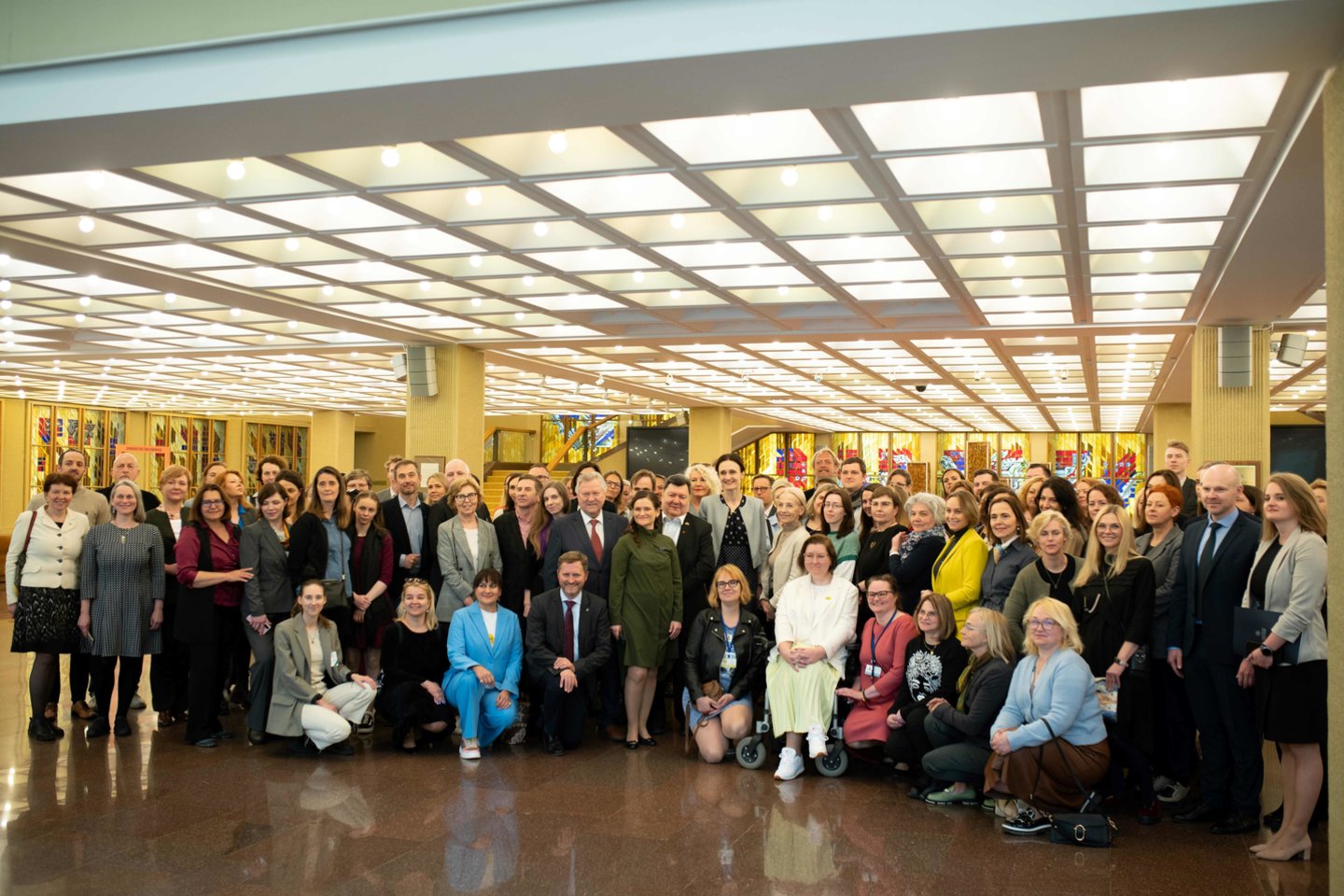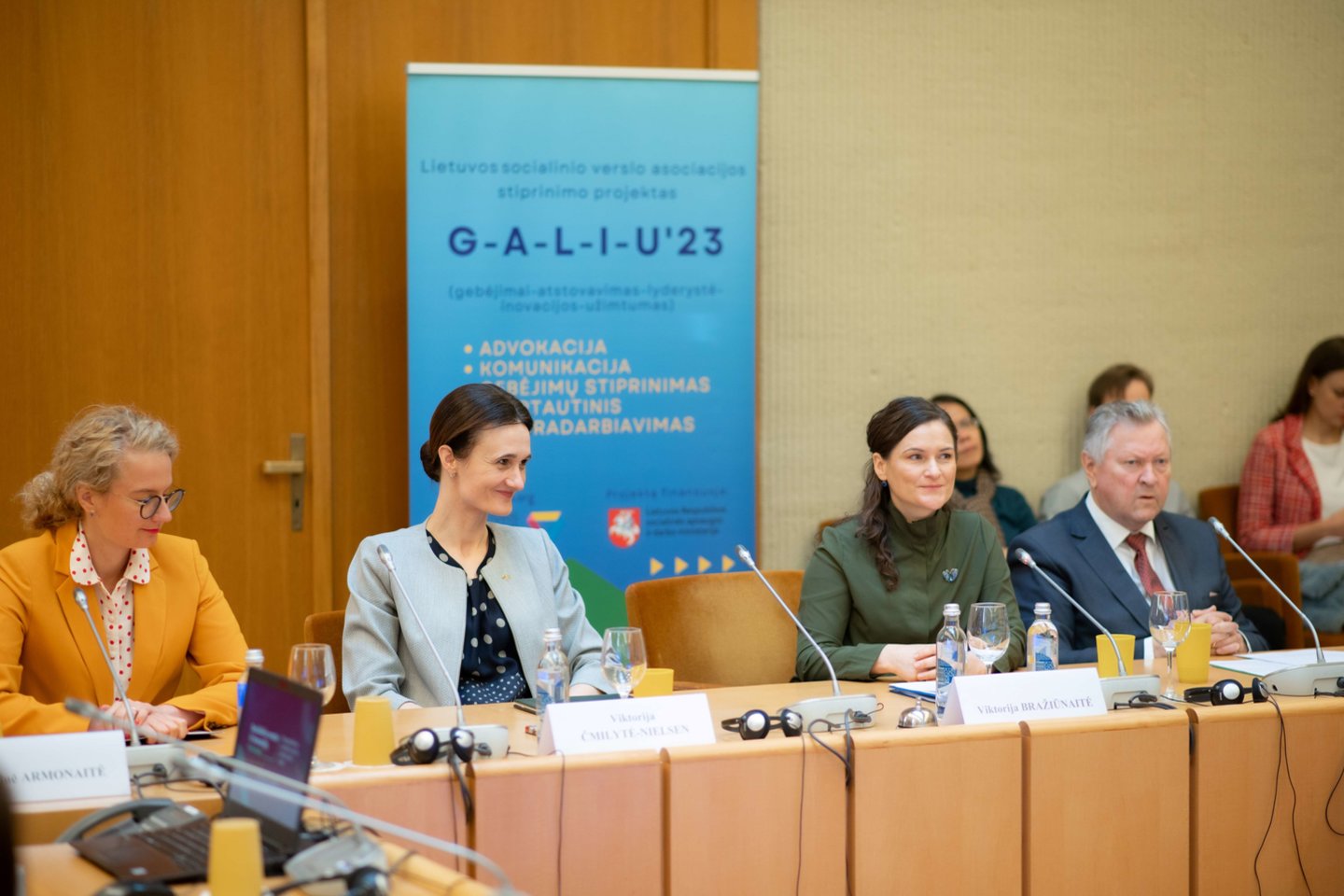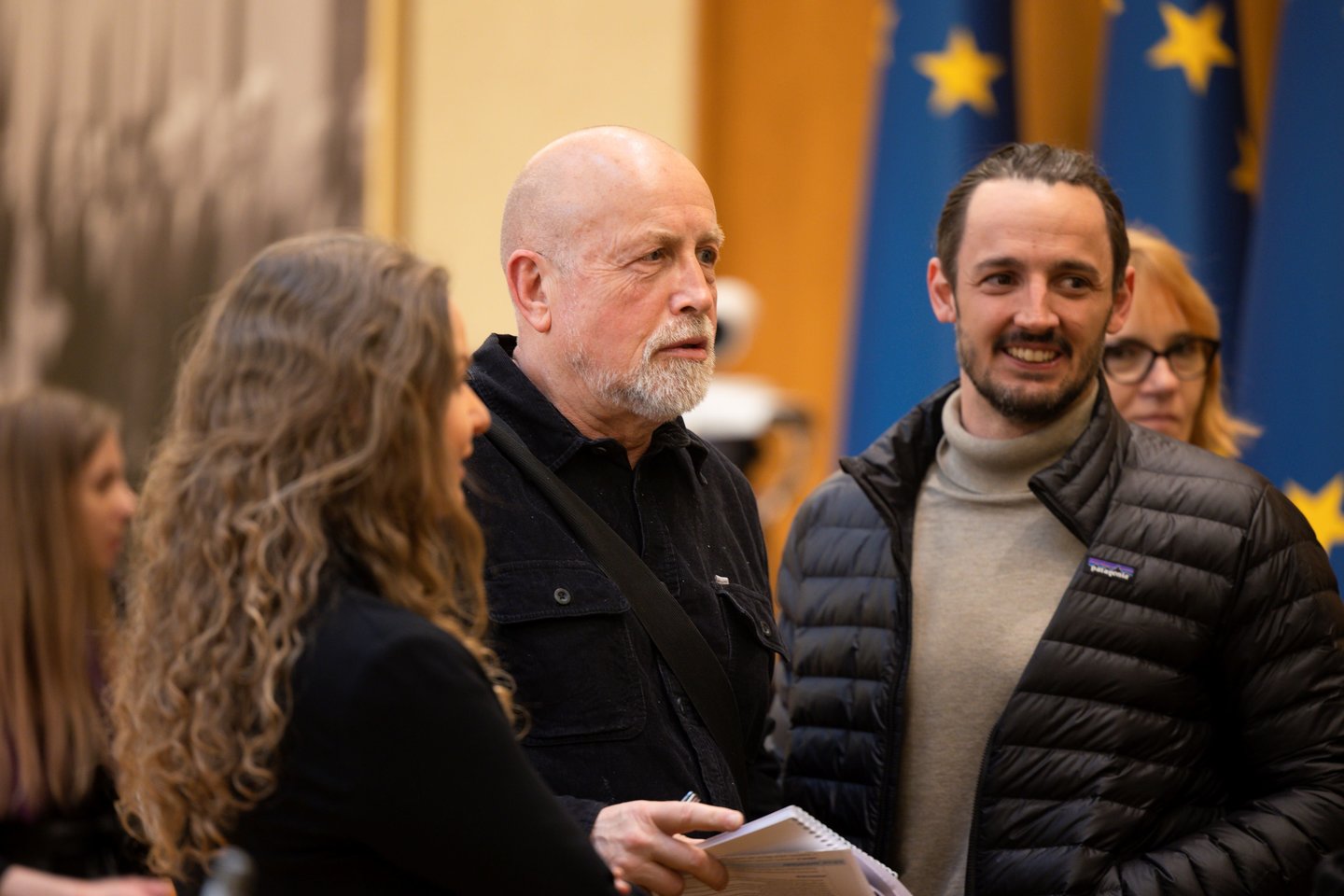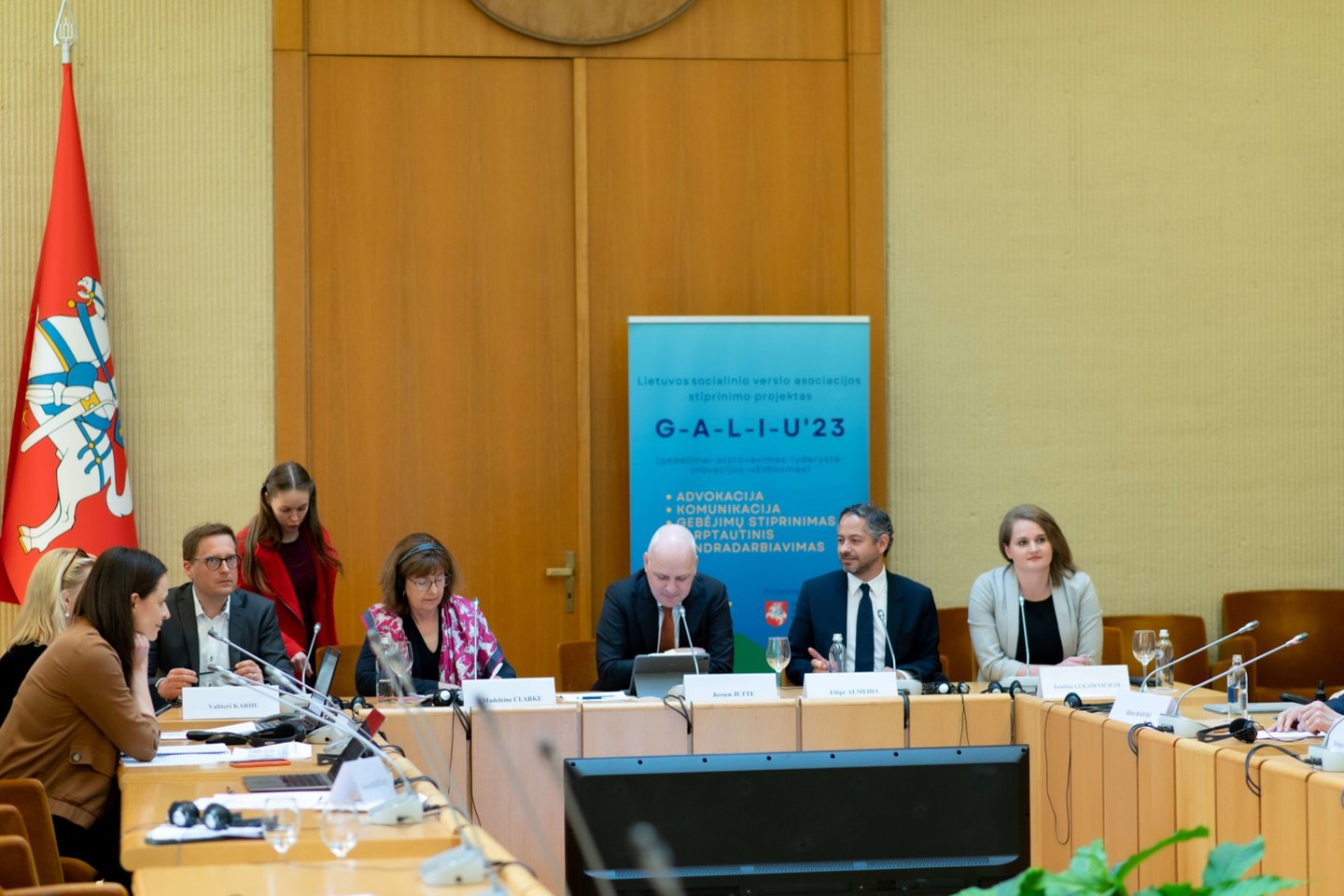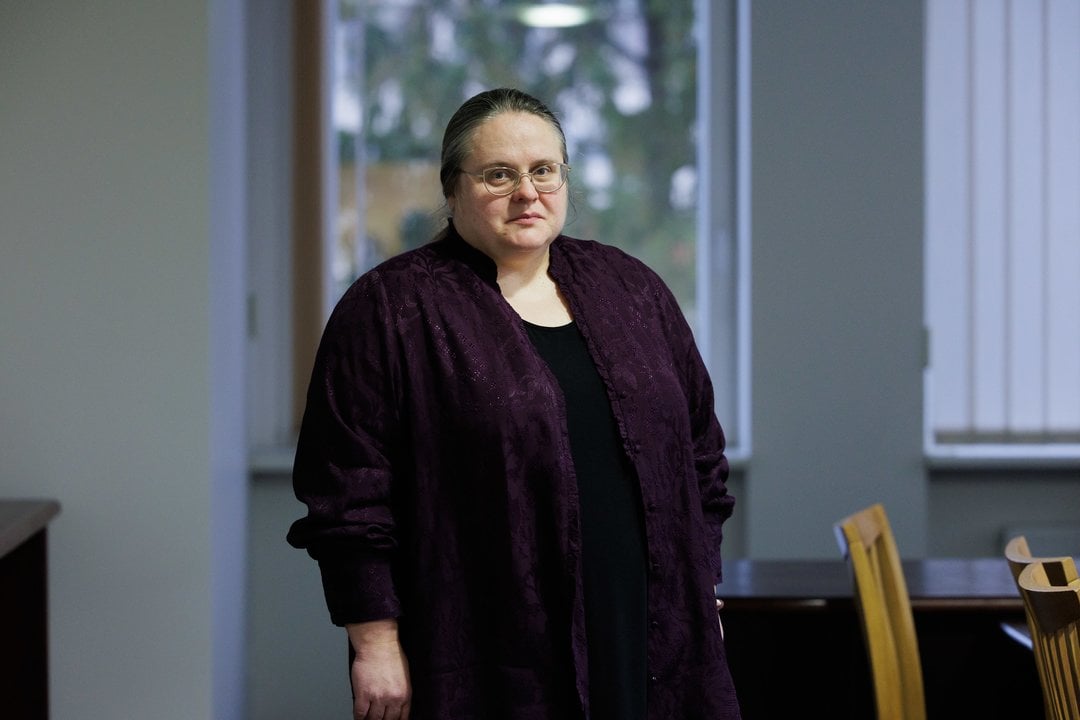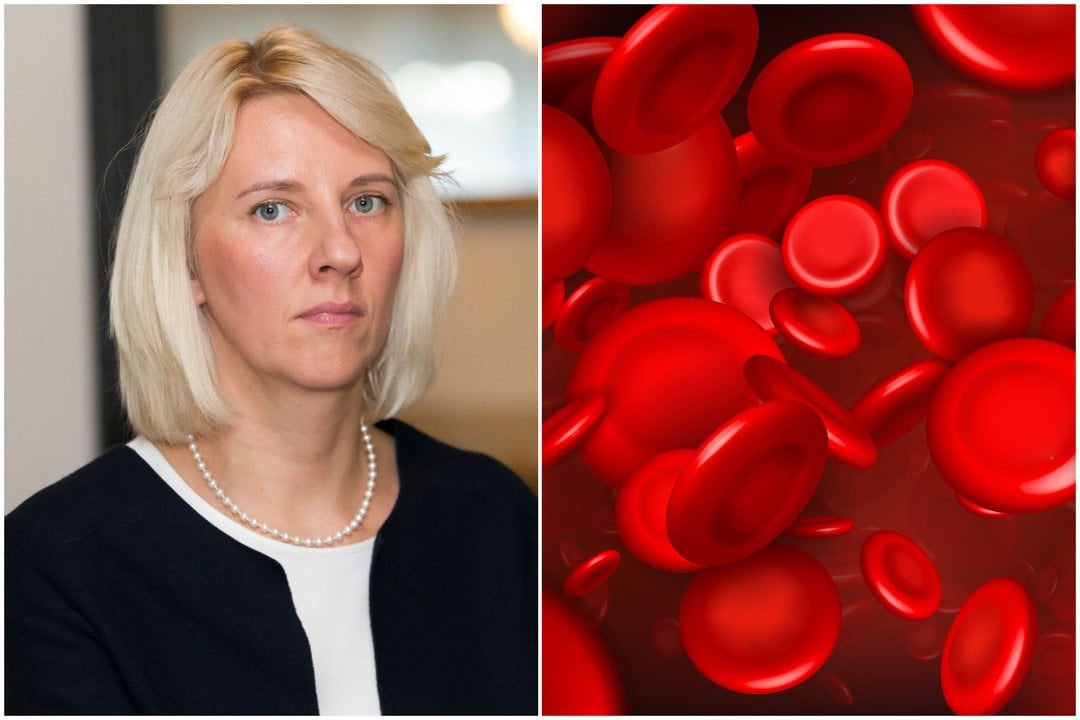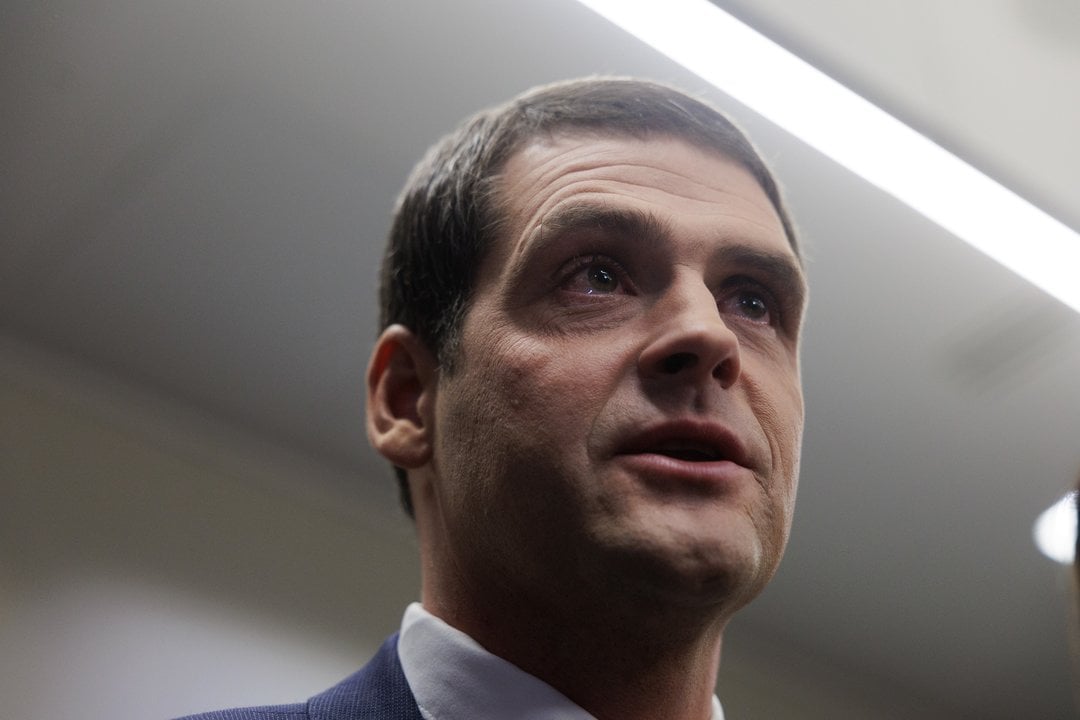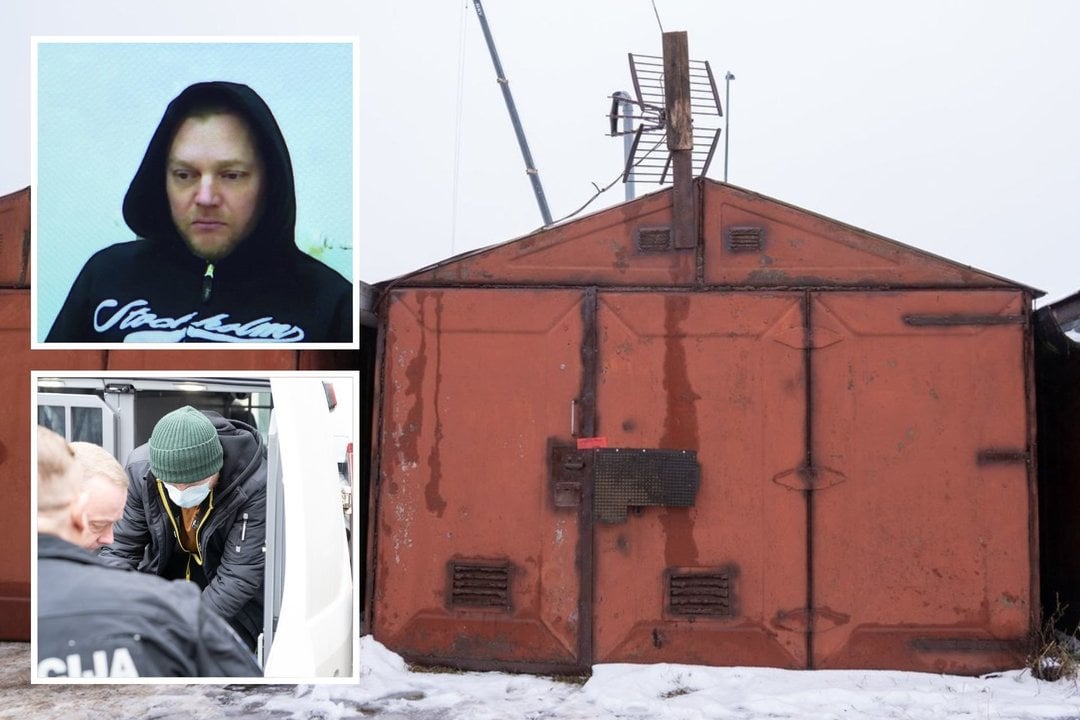The speakers at the Forum covered a wide range of topics relevant to the social business ecosystem: the legal framework for this business model, the possible integration of the definition into our country's legislation, the criteria for social business and its uniqueness were discussed. The politicians present at the event shared their future plans and political steps that will guarantee the development of social business. Social entrepreneurs from Lithuania and abroad shared valuable experiences that can inspire others to take up this challenging but very important business model.
We invite you to read the key messages of the speakers, which reflect a wide range of topics and issues and may invite you to return to the Forum, which is available online:
LT: https://www.youtube.com/watch?v=8MoVnuOJEEQ
EN – https://www.youtube.com/watch?v=YP3FKh_nmQY
Welcoming the Forum participants, the Speaker of the Seimas of the Republic of Lithuania, Viktorija ČMILYTĖ-NIELSEN, emphasised: „The practice of other countries shows that investments in this sector pay off, as the potential of social business is huge both in terms of stimulating the economy and addressing issues of public concern.“
In a high-level policy session on the vision for the development of social business, the Forum was welcomed by Nicolas SCHMIT, European Commissioner for Employment and Social Rights, who said that „a social economy is a tool for achieving social inclusion and environmental objectives. The European Union's guidelines on social human rights and the Green Deal cannot be implemented without the social economy“. And Dmytro NATALUKHA, Chairman of the Economic Development Committee of the Verkhovna Rada of Ukraine, who also participated in the Forum remotely, stressed that Ukrainians want to learn from Lithuanians about social business and innovation and are open to ideas from Lithuania that are future-oriented: „I'm sure the future will show us that we can be partners, not just friends. The more we are involved in different dialogues, the more I believe that.“ Víctor MESEGUER SÁNCHEZ, Special Commissioner for the Social Economy of the Spanish Government, spoke about how the Kingdom of Spain is working to accelerate social entrepreneurship through the Next Generation EU-funded Investment Plan, which provides as much as €800 million for development of the social economy.
Aušrinė ARMONAITĖ, Minister of Economy and Innovation of the Republic of Lithuania, shared the future perspectives for social business in our country: „This year, we plan to update and adapt the Social Business Concept, which was approved in 2015, to the already changed situation. I believe that we can make a bigger breakthrough in the field of social business and thus create even more opportunities for Lithuania.“ Kazys STARKEVIČIUS, Chairman of the Economic Committee of the Seimas of the Republic of Lithuania, pointed out that the Council of Europe's Recommendations on the Creation of Basic Conditions for the Social Economy will soon be published, which will help policymakers in the EU countries to better adapt their policies and legal frameworks to the needs of the social economy: „Policies and legal frameworks are very important for the creation of an environment that is suitable for the social economy to thrive. This includes taxation, public procurement and state aid systems, which need to be adapted to the needs of the social economy“. In his presentation, Martynas ŠIURKUS, Deputy Minister of Social Security and Labour, stressed the importance of public procurement, as it is through this that the state indirectly stimulates a very large part of business, and he also shared an innovation for the future: „One more thing is the social impact bond challenge, where businesses are used to solve certain social problems. This is a completely new area where we are still developing the legal framework, but in principle it is a very big opportunity for innovation to contribute directly to solving the social problems facing the country“.
Viktorija BRAŽIŪNAITĖ, Director of the Lithuanian Social Business Association, who delivered the keynote speech at the Forum, stressed that it is particularly important today for the entire social business community, for its most active members, to be involved in decision-making: „For this purpose, we have even launched two initiative formats: the informal Social Business Development Working Group and the National Social Business Dialogue, which we organised with the European’Diesis Network’ last year. Therefore, I invite all stakeholders to continue to actively participate in the development of the social business environment and not to wait for someone else to decide for us.“
Petro DARMORIS, Head of Social Economy Ukraine, who participated remotely in the Forum, noted that in times of war, recovery and reconstruction, the role of social entrepreneurship is more important than ever: „We need to come together to support and empower the social entrepreneurs who work tirelessly to address the critical social and economic challenges facing war-affected communities. By providing innovative and sustainable solutions, we can help build stronger and more resilient communities, better equipped to face the challenges of unemployment, poverty and lack of social services.“
Alessia SEBILLO, Managing Director of DIESIS Network, speaking remotely to the Forum participants, emphasised: „We support social business solidarity worldwide. All 55 members of the network are working together to build a more sustainable economy through international cooperation and the exchange of best practices. Only by working together can we fight together and overcome the world's crises.“
Speakers in the first session shared their insights on the conditions needed to create a thriving social business ecosystem. Viktorija NAUSĖDĖ, founder and director of TEXTALE, shared her experience running a social business start-up based on circular fashion: „Today, the social business opens up a wide range of opportunities. Alina BOCHARNIKOVA, Social Innovation and Social Business Advisor at Future Development Agency, who travelled from Ukraine for several days to attend the Forum, shared her experience setting up a coordinating council to promote social business development in her country: „We realised that we need to look deeper. A document is a document, but people are behind the programme, and only people can make the programme successful. So we took six months to bring together organisations that could contribute to strengthening social entrepreneurship“.
Marie STRAND FUGELSNES, Digital Solutions Consultant at Friskus, represents a Norwegian social business organisation that has developed a unique cultural and activity calendar and a social networking platform that allows citizens to actively contribute to their communities. She said that Friskus works closely with 40 municipalities in Norway, so the necessary solutions are born very quickly. „When we found out that Ukrainian refugees were coming to Norway, one of the municipalities, Tonberg, which had already had experience with our networking platform, announced the need for volunteers and within 2 weeks, we received 160 requests from volunteers who were interested in helping the Ukrainian refugees.“
Jorien van LOOKEREN CAMPAGNE, Project Manager for Government Relations at Social Enterprise NL, who spoke in the first session, highlighted three key factors for a strong social business ecosystem: legal recognition and structure, cooperation with local authorities and international exchange of knowledge and research findings. Ryan TURNBULL, Member of the Canadian Parliament and Chair of the Inter-Parliamentary Group on Social Innovation, who himself has been instrumental in the creation of 350 social businesses, argued that social innovation and social businesses are essential for building a stronger, sustainable economy. He stressed that social innovation tackles systemic problems and helps the most vulnerable to participate fully in the economy.
Romualda STRAGIENĖ, Director of the Innovation Agency, shared what services social entrepreneurs can use to grow their competencies and impact and explained how innovation and its application in their work can contribute to strengthening the impact of social businesses: „Once businesses realise that they are already businesses, they are much more confident to come to us and get integrated services“.
The speakers of the second session addressed how we can effectively harness social innovation through the priority actions envisaged for the further dissemination of successful initiatives. What is the vision and objectives of the ESF+ Social Innovation+ initiative? Insights were shared by the Head of the ESF+ Unit of the European Commission's Directorate General for Employment, Social Affairs and Inclusion and by national experts in the field of social innovation from Ireland, Poland, Lithuania, Finland and Portugal.
JEROEN JUTTE, Head of the European Social Fund+ Unit of the European Commission's Directorate General for Employment, Social Affairs and Inclusion, emphasised in the Constitutional Hall of the Seimas that citizens' well-being should not only be about economic prosperity but also about social prosperity based on fundamental human rights. „Even in a situation where all sectors are struggling for scarce resources, even in such a context, we need to think foremost about social well-being, to innovate and use innovation for the benefit of the people. The European Social Fund will provide €3 billion to support social innovation projects. We need to identify good examples of social innovation and replicate them in other regions of Europe, involving the European population itself in the dissemination of social innovation and providing them with career opportunities,“ emphasised Mr Jutte.
It was the increased demand for the development of social innovation in Europe that led to the creation of the ESF+ Social Innovation+ initiative. The aim of the initiative is to disseminate good examples, encourage countries to learn from each other and learn from their mistakes, and help create and innovate at the EU level. „The experience gained in Europe over the years can be useful not only at the Community level but also beyond the EU,“ emphasised Ms Jutte in her speech.
The senior European Commission official said that financial support is important, but so is cooperation, networking, pooling of wisdom and knowledge. „With such a strong foundation, we will make enormous progress in social innovation,“ stressed the Head of the European Social Fund+ Unit of the European Commission's Directorate-General for Employment, Social Affairs and Inclusion.
FILIPE ALMEIDA, Head of the Portuguese Mission for Social Innovation, presented his country's case during the Forum's second session, showing how a national initiative to promote and develop social innovation, launched ten years ago, has become a great example for Europe.
„We have developed a framework for a range of financial solutions using both public and private funds. Our financial instruments help meet the needs of different organisations: social business start-ups, social organisations at different stages of their life cycle and others. We aim to strengthen the social innovation ecosystem in Portugal, to simplify funding models, to measure the impact of social businesses and to develop the most effective mechanisms for translating social business practices into policy“, the Head of the Portuguese Social Innovation Mission shared his experience.
Dominika TALDA, Deputy Director of the European Social Fund Department at the Polish Ministry of Development Funds and Regional Policy, highlighted in her presentation that, as the Polish example shows, several approaches are important for the promotion and dissemination of social innovations: „Micro-innovations, which are related to individuals or small NGOs, toward a kind of social experimentation; social incubators, which not only create social innovations but also promote their development and deeper analysis; and macro-innovations, which are developed, tested and planned by public institutions. Also very important is the assessment of the quality of social innovations, their development and application in other sectors, and a certain active base of social innovation actors, which is essential for the creation of a social innovation ecosystem.“ Mr Tadla stressed that the network of social incubators developed in Poland is a key instrument for the development and dissemination of social innovation in our neighbouring country.
Mr Valtteri KARHU, Chief Specialist at the Finnish Ministry of Economic Affairs and Employment, shared during the Forum how social innovation is helping to address the challenges of institutional care for children and adolescents. „Social innovations to address this problem in Finland are mostly implemented at a regional level, but the aim is to analyse the results of such successes, to develop proven innovations, and to develop systems and models and deploy them at a national level.“
MADELEINE CLARKE, CEO of Genio, an Ireland-based organisation that promotes collaboration between philanthropic organisations and policymakers, highlighted the importance of collaboration between the public, private and business sectors in the process of designing, developing and disseminating social innovations in a keynote speech.
According to Ms Clarke, these sectors often struggle to find common ground at the outset and tend to criticise each other's performance. However, it is when highly experienced professionals from these different sectors come together with a common purpose and a common focus that many great ideas and work in the field of social innovation are born. With the commitment of the Irish Government to the development of a national policy for the development of social innovation, and the collaboration of these sectors, we expect to see very significant results in the development and diffusion of social innovation.
JUSTINA LUKAŠEVIČIŪTĖ, Adviser to the NGO Development Unit of the Ministry of Social Security and Labour, told the Forum that the development of social innovation is a priority for Lithuania, but that we still face some challenges. We do not always recognise social innovation, and we have not defined what it is; there is still a lack of indicators to measure the situation of social innovation in our country; there is a lack of flexibility in funding for social innovation; there is still a lack of communication between state institutions, NGOs and business organisations. However, according to the Ministry representative, concrete actions are already underway, and there are concrete plans for the future on how we will act to increase the development and expansion of social innovation in Lithuania.
NERINGA POŠKUTĖ, Head of the Social Innovation and International Initiatives Unit of the European Social Fund Agency, and the ESF+ Social Innovation+ initiative, presented the objectives and stages of the ESF+ Social Innovation+ initiative. She mentioned that the Initiative will be implemented through calls for project proposals at the EU level and the establishment of a European Centre of Excellence for Social Innovation. In her speech, Neringa Poškutė highlighted the main objectives of the Initiative's activities, which are to promote the use and application of social experimentation, social innovation and community-led local development on a wider scale across the EU, to create a European community of experts and support organisations in social innovation, and to foster evidence-based strategies for social innovation and policy reform through social experimentation and innovation.
„We believe that the ESF+ Social Innovation+ initiative will respond to recent social challenges in EU countries and accelerate the exchange of experience and good practice between EU countries“, said Neringa Poškutė.
The Initiative will run until 2030 and has a budget of €197 million.
Communities of Practice and networks will be key tools to promote cross-border cooperation between ESF+ bodies and support structures. The National Centres of Excellence for Social Innovation, the Focal Points of the Employment and Social Innovation strand of the programme and other relevant stakeholders in the application and development of social innovation will be important structures contributing to the success and functioning of the ESF+ Social Innovation+ initiative in EU countries.
The Forum participants discussed ways to accelerate the development of social business ecosystems, shared their experiences and discussed lessons learned. Simas GAIDELIONIS, Chairman of the Eičiai community „Karšuva“, shared his experience: „Our community and our village were declining. The population was decreasing. Now we have stopped that. Now the community invests the money it earns and contributes to various initiatives and projects of the villagers. We have become agents of change, not just petitioners“. Stein Rune ERIKSEN, subject leader of the Norwegian social business organisation Fullt Focus, shared his experience: „I represent a small organisation that works in the field of human trafficking and crime prevention. Last year we had 70 children in institutional care. We made sure that they avoided prison sentences. The work of our organisation is well recognised, and the community sees the results of our work“.
Julia B.C. MOREIRA, Chief Analyst and Project Manager at SwIdeas, a Swedish social business organisation, presented the green and sustainability activities that SwIdeas is currently implementing with the Lithuanian Social Business Association in the project „Measuring Green Impact“. „Measuring impact is important because it can inspire larger organisations to take stock of the impact they are making, to attract investment and to build new partnerships. This becomes even more relevant as various green initiatives become mandatory. If you have a positive impact on the environment, you have a positive impact on society.“
Lucie MONCION, Member of the Canadian Senate, spoke about what has helped Canada build a thriving social business ecosystem: networking, targeted financial instruments and the right legislative framework. 750 million Canadian dollars are allocated to promote social business in ten provinces. Quebec is the most entrepreneurial and innovative, with social businesses generating billions of dollars in revenue and helping the community to grow and thrive“. Filipe ALMEIDA, Head of the Portuguese Mission for Social Innovation, shared his country's experience of building a strong foundation for social business: „It was a joint creative effort by civil society and the private sector, not the government. Patrizia BUSSI, Vice-President of Social Economy Europe and Director of the European Network for Social Inclusion said that her organisation hopes to act as an intermediary with the European institutions, the European Parliament: „The Commission has published an action plan with 63 concrete actions to be implemented for the benefit of the social business sector. I am pleased that the Lithuanian parliamentarians support this sector“.
Monika OŠMIANSKIENĖ, a member of the European Affairs Committee of the Seimas, who took part in the discussion, pointed out that in Lithuania, social business is still often confused with the infamous social enterprises, which received state support for employing people with disabilities, and that there have been many cases of abuse. She stressed: „We must be very careful in the regulation of social businesses.“
The Forum was summarised by Patrick KLEIN, Head of the Social Economy and Social Business Sector at the European Commission's Directorate General for Internal Market, Industry, Entrepreneurship and SMEs, who shared that the Council of Europe's recommendations on public procurement, education, etc. are currently being drafted: „It is very important for social businesses to be able to take part in public procurement, to access that market, to generate income and to become financially independent. It is important that social business works in partnership with traditional business and that we move towards a sustainable and green economy in this transition period“.
„I am delighted that many actors from the social business ecosystem have come together again this year. The dialogue continues. We are looking forward to joint work and co-creation on what kind of social business we want in Lithuania and what we will do soon“, said Viktorija BRAŽIŪNAITĖ, Head of the Lithuanian Social Business Association, summing up the results of the Forum.
The Forum was organised by the Lithuanian Social Business Association (LiSVA) together with the Economic Committee of the Seimas of the Republic of Lithuania, in cooperation with the Ministry of Economy and Innovation, the Ministry of Social Security and Labour, the Innovation Agency, the Nordic Council of Ministers' Office in Lithuania, and the ESF+ „Social Innovation+“ initiative, Social Economy Ukraine, the Parliamentary Forum for Democracy, the Embassy of Canada, the European Social Integration Network, the Martynas Mažvydas National Library of Lithuania, the Raoul Wallenberg Centre for Human Rights in Canada, and the Public Institution Lithuanian National Radio and Television, among other partners.
